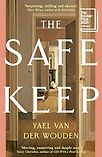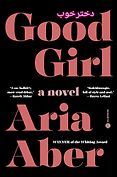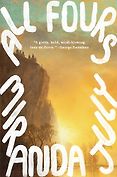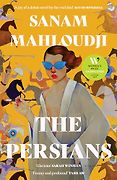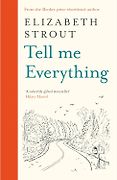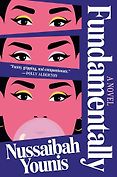Thank you for joining me to discuss the 2025 shortlist for the Women’s Prize for Fiction. What were the judges looking for?
Excellence, I have to say. But also something that I couldn’t stop reading. That, to me, is the mark of a good book. All of us have read books that we think we should read—everyone has been telling you to read it, or it’s a classic—and so you read it, but slightly under duress. What I wanted, what I was looking for, is the opposite of that. Where I thought: Oh my god, I have to go to bed, but I can’t stop reading this book! That, for me, is what a good book is.
I think that’s what a lot of people are hoping for when they pick up a new book.
Absolutely. Obviously if you’re at university, or if you have to read for work, or school, it might be different. But if you read for joy, then you just want something that you can’t put down. Whether that’s a thriller, a romance, crime novel, it doesn’t matter. You just want a book that makes you forget the world and all its madness for a couple of hours.
You chaired this year’s judging panel, which also included the novelist Diana Evans; the memoirist and mental-health campaigner Bryony Gordon; the magazine editor Deborah Joseph; and the composer Amelia Warner. How did you approach the judging process?
I approached it on the basis that everyone else on the panel knows more than me, which is usually right. There was no hierarchy among the judges. I literally had nothing to do. These are intelligent, strong, well-read, funny, articulate, compassionate women. It was like the ultimate book club.
Sounds like the best way possible to be spending your time. Let’s talk about the shortlisted books themselves, starting with Good Girl by Aria Aber. It’s from the point of view of Nila, a 19-year-old Berliner railing against her upbringing. Why did this book make it onto the shortlist for the 2025 Women’s Prize for Fiction?
It perfectly captured this time in a woman’s life, or this woman’s life.
She’s the daughter of an Afghan refugee in Berlin, and she’s ashamed of it. Anyone that has had shame in their lives, especially shame related to your identity, will really identify with this book.
There’s a section in it where she really fancies this guy, a very unsuitable guy, and—as we all do—she is trying to be cool, trying to say the right thing, to sit right, eat right, smoke right.
It has really unusual sentence structures—the way they start. It’s quite extraordinary, really. So well done.
The author, speaking about the writing of this book, said: “I was interested in the innocence but also the slipperiness that youth allows you to inhabit, enact and perform, but that’s also often a little dangerous.”
Nila is trying things out, trying to stabilise herself, trying to accommodate all the aspects of herself that fight against one another. It’s not easy to write about that time of life without becoming maudlin and it isn’t that, it has a lot of life in it.
Let’s talk about Miranda July’s All Fours next. It’s been something of a phenomenon both here in the UK and in the US, where she’s from.
There’s no way to get around this, it’s weird. I love its weirdness. It’s about a woman who is a semi-famous artist who embarks on a road trip from one side of America to the other. She’s been given some money and she’s always wanted to do this. She says goodbye to her husband and child, gets to the next town and stops. The whole book is about what happens in that next town. She never makes it across the country.
It is so unusual, I’ve never read a book like it. The concept of the book and the way it’s a woman speaking about a distinct time in a woman’s life—it’s like: ‘Who am I? What do I want? Am I a mum, doing small town things? Am I more than that? Do I want an adventure? Should I completely derail my life? It’s chock, chock full of life. Literally bursting with life.
I suppose she’s having a midlife crisis. The New York Times called it “the first great perimenopause novel.”
I’m slightly sick of the perimenopause or menopause being presented as a catalyst for change. Is that when you’re allowed to be a bit weird, to take control of your life? Do we now have to have a reason to reclaim our lives? So I’m not keen on ‘the menopause made me do it.’ Or ‘the menopause made me realise…’
You’re talking to a woman who had the menopause at 39, and it did upend my life. So I understand. But it’s a bit of a convenience that women have to have a medical reason for their reclamation. Men just ‘realise.’
Well, I certainly don’t need to be going through hormonal changes to have a crisis in my own life.
Absolutely.
How much do you see the Women’s Prize as needing to engage with or portray the stages of female life? Is it about that at all, or is it purely aimed at recognising women writers?
I think when fiction engages with a woman at a certain stage of life, it resonates. So that’s why people say ‘menopause novel’ or ‘mother’s novel.’ It’s a shorthand for: if you have this life event going on, there will be resonances. Of course that speaks to women, and it’s an important thing, but I don’t think we have to have that.
I mean, thinking of Miranda July’s book, I certainly didn’t do that. I understand that there’s a time of life when it might hit you. But these life events don’t necessarily hit you when they ‘should.’ For example: people are having children later. So you can’t say, ‘Oh, you’re 27, you’ve just had your first baby…’ You might be 45 and just had your first baby! Women are changing careers at 55. Or women are discovering they want to be in a same-sex relationship at 32. It’s all a mishmash.
I think we should give permission to have these life events when we have these life events, not by nailing them to motherhood, or the menopause, old age, coming of age. Although, no doubt, there are definite patterns in what you feel at a certain age.
Let’s move on, to the third book on the 2025 Women’s Prize for Fiction shortlist. This is The Persians by Sanam Mahloudji, a multi-generational saga that follows an Iranian family that flees to the US during the 1979 revolution. What did the judges admire about this book?
The joy. It’s very funny, and it’s so unexpected. When I picked up the book, I didn’t know anything about it. I didn’t want to read any blurb or reviews, I just came to the work very clean. So I thought, when I picked this up, that it would be a historical novel about the Persians. I expected a different country, a different time, a different culture. But then this opens and it’s like the Kardashians of Aspen.
They were once a very, very wealthy family, with servants and everything. It’s told from lots of different points of view, of women within this family. And it’s a book about who they are now, now they’ve lost their money, their clout. How can they negotiate America as immigrants—and not powerful immigrants either. It’s very good, very funny.
Yes, it sounds very entertaining.
Of course, it has very serious undertones. But it’s a joy to read.
Next up, we have Elizabeth Strout’s Tell Me Everything, which continues to embroider new stories within this very detailed fictional world that she has created. Tell us more.
This is a book about small people in a small town. It’s a celebration of ordinariness. It’s certainly about inner turmoil, coming to terms with ageing, and coming to terms with history—you know: your history, my history, everyone’s history and how it affects us.
It’s also a sort of love story and a sort of murder mystery. I mean, it’s everything! And yet it’s so gentle. You know the way some of the most gentle things can be the most powerful, because they come at you slowly but forcefully? It’s lovely.
It also feels very much like a classic. There’s no earthquakes, no murder. Well, there is a murder, but you don’t see the murder. It’s gentle, affecting, and very well written.
It’s lovely to see Elizabeth Strout receiving so many garlands as her career goes on. I think, to begin with, these books were seen as ‘easy reading,’ but her literary cachet has grown.
Yes, these kinds of books can be underestimated. This has no big shocks in it. I don’t think it has a ‘fuck’ in it. As I say, gentle but powerful. It definitely speaks to who we are now, and of those small towns where nothing, apparently, is happening, and yet so much is happening.
Our next book is Yael van der Wouden’s The Safekeep, which has already found a great deal of success. It was also shortlisted for the Booker last year. Tell us why.
It’s set in Holland in the 1960s, and it’s about this pretty unhappy woman who lives in a house. Her brother’s girlfriend comes to stay with her. It’s really about the relationship between the two women, and also about how history rises up unbidden and knocks your life aside. It’s very well written. I think it will be a classic. It’s short as well!
The subject matter is unusual, and yet we think we know it. 80% of the book takes place in the rooms of a house. It’s not a big adventure, it’s a mini, interior adventure that this woman goes on, and the horrible realisation that she makes about who she is and the things that have been done in her name.
The final book on the shortlist is quite a change in tone. This is Fundamentally by Nussaibah Younis, which The Times described as “Bridget Jones in Iraq.” Is that right?
That’s accurate. Well, it’s not quite Bridget Jones, but it is the most surprising book on the list. I saw the title and—as I say, I came to the work knowing nothing—and I thought, okay, it will be a very serious book about fundamentalism and how it affects young girls like Shamima Begum, groomed young girls who were radicalised and went out to join ISIS.
And it is about those girls. But, oh my God, this book is so funny. How she’s managed to make that subject funny and light, I don’t know. It peels back the veneer of sophistication and seriousness around the UN. You’d assume it was all very serious and proper, but no.
It also doesn’t pull its punches about who these women are and what they want, as well as the protagonist herself being a surprising person of what you might think Muslim women are. It’s very good and, above all, funny. It’s definitely a book that you turn the pages to see what happens.
I was immediately struck by the incredible range in these shortlisted titles. Did the judging process leave you feeling optimistic about the state of fiction today, and especially women’s writing?
Oh, completely. Women are leading the way in tackling some of these big subjects. They aren’t shying away from surprising narrators, ugly subjects, writing about sex in new and brave ways. From old subjects that we think we know, or—like Elizabeth Strout—saying, well, this is just who I am and what I write about.
Interview by Cal Flyn, Deputy Editor
April 15, 2025. Updated: December 7, 2025
Five Books aims to keep its book recommendations and interviews up to date. If you are the interviewee and would like to update your choice of books (or even just what you say about them) please email us at [email protected]
Five Books interviews are expensive to produce. If you've enjoyed this interview, please support us by donating a small amount.

